Why retired generals rarely lead the Pentagon
- Written by Dwight Stirling, Lecturer in Law, University of Southern California
By all accounts, retired Army Gen. Lloyd Austin, President-elect Joe Biden’s pick to lead the U.S. Defense Department, is eminently qualified to be secretary of defense. A man who achieved the rank of four-star general[1] and succeeded at every turn during his 40-year career, Austin displayed valor and courage[2] while serving the country for nearly half a century.
Ironically, though, Austin’s lengthy military career has created a sticking point[3] in his confirmation process. The law requires[4] a service member to be out of uniform for at least seven years[5] before assuming the civilian role of secretary of defense.
Austin left the Army just over four years ago, making him technically ineligible for the post. Congress would have to waive the waiting period in order to confirm him, something it has only done twice since 1947[6], most recently in 2017.
Austin’s nomination is historic[7]. He would be the first African American to lead the nation’s military establishment, a step toward broadening[8] the Pentagon’s largely white male leadership ranks[9].
Yet the fact that Austin’s extensive military experience is clouding his prospects[10] raises the question of why the seven-year delay exists[11] in the first place.
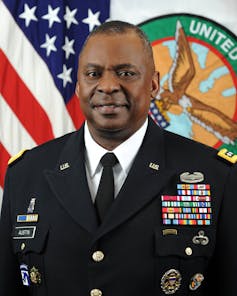 Retired Gen. Lloyd Austin is expected to be nominated to serve as Joe Biden’s secretary of defense.
U.S. Central Command, via Wikimedia Commons[12]
Retired Gen. Lloyd Austin is expected to be nominated to serve as Joe Biden’s secretary of defense.
U.S. Central Command, via Wikimedia Commons[12]
Civilian control over the military
The formal legal delay dates from the end of World War II, but the concept behind it harks back to the nation’s origins and lies at the heart of the American military tradition[13].
The Founders had personally experienced an empire’s use of a standing army and therefore viewed large military forces as the hallmark of authoritarianism[14] and an inherent threat to democracy. They believed that generals’ influence over how armies are used[15] must always be subordinate[16] to those officials directly accountable to the people[17].
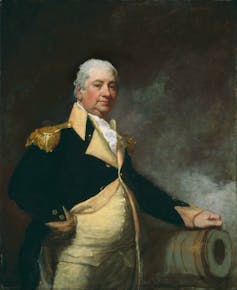 The nation’s first secretary of war was Henry Knox, a former bookseller turned military commander in the Revolution.
Gilbert Stuart, via Wikimedia Commons[18]
The nation’s first secretary of war was Henry Knox, a former bookseller turned military commander in the Revolution.
Gilbert Stuart, via Wikimedia Commons[18]
Samuel Adams[19] wrote in 1768 that “even when there is a necessity of the military power, within a land, a wise and prudent people will always have a watchful and jealous eye over it.” In 1776, the Virginia Declaration of Rights[20] asserted that “in all cases, the military should be under strict subordination to, and governed by, civil power.” That document became an inspiration for the Declaration of Independence and, later, a model for the Bill of Rights.
When it came to the Constitution, the Founders specifically prescribed[21] civilian control[22] over the military by assigning the president the role of commander-in-chief while giving Congress the power to set the military’s rules and budget.
In the wake of World War II, Congress worried that the American public had increasingly fallen under the spell[23] of charismatic generals like Douglas MacArthur, buying into the argument that greater autonomy should be given to the heroic captains of battle. As MacArthur saw things[24], the prerogative of proven warriors should not be checked by civilians who know nothing of war.
Congress disagreed and created the waiting period to limit career military officials’ eligibility to run the newly created Department of Defense. A 10-year gap in service – later shortened to seven years[25] – would allow a general’s “star to fade[26]” to an acceptable level, reducing their influence over the public.
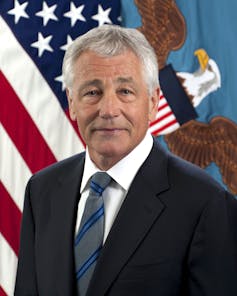 Chuck Hagel, secretary of defense under Barack Obama from 2013 to 2015, was a veteran but not a career member of the military.
Monica King, U.S. Army/Department of Defense, via Wikimedia Commons[27]
Chuck Hagel, secretary of defense under Barack Obama from 2013 to 2015, was a veteran but not a career member of the military.
Monica King, U.S. Army/Department of Defense, via Wikimedia Commons[27]
Many defense secretaries have been veterans but not career soldiers – like Chuck Hagel[28], who had been a soldier in the Vietnam War in 1967 and 1968, decades before he led the Pentagon[29] for President Barack Obama from 2013 to 2015. Others have been scholars, politicians and leaders of business or industry, like James Forrestal[30], appointed the first defense secretary in 1947, who had worked on Wall Street before joining the government.
Their leadership skills and experience were developed at least as much outside the military as within it.
‘A specialized society separate from civilian society’
As a major in the Army National Guard, I am familiar with the mentality of career military officers.
During my nearly 20 years as a military lawyer[31], I have never heard a senior officer tell a superior he or she couldn’t accomplish a mission. In the mind of a colonel or general, there is literally nothing that cannot be achieved with a well-disciplined group of soldiers, smart tactics and an ample supply of funding and equipment.
This can-do attitude is part of the career officer mentality – but so is a certain intolerance for dissenting opinions. The foundational premise of military management is a unity of command and a single voice of authority[32]. Senior officers typically have little patience for opposing views or consensus-building. Diversity of thought is not celebrated; contrarian views are not welcome.
[Deep knowledge, daily. Sign up for The Conversation’s newsletter[33].]
As the Supreme Court has observed, “the military is, by necessity, a specialized society[34] separate from civilian society.” It is an institution that has “developed laws and traditions[35] of its own during its long history,” a body where, in the end, the “law is that of obedience[36].”
Might Austin receive the third waiver?
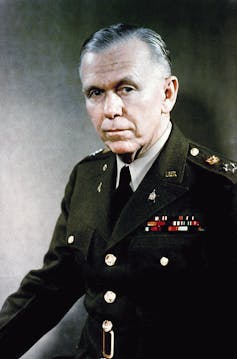 George Marshall, the first U.S. five-star general in the 20th century, later served as secretary of defense – but only for a year.
U.S. Department of Defense, via Wikimedia Commons[37]
George Marshall, the first U.S. five-star general in the 20th century, later served as secretary of defense – but only for a year.
U.S. Department of Defense, via Wikimedia Commons[37]
Retired Gen. George Marshall received the first waiver of the waiting period[38] in 1950. Marshall made a candid observation[39] during the nomination process: “As a second lieutenant, I thought we would never get anywhere in the Army unless a soldier was secretary of war. As I grew a little older and served through some of our military history … I came to the fixed conclusion that he should never be a soldier.”
Considered uniquely qualified to oversee U.S. forces[40] in the Korean War, Marshall was eventually confirmed on the condition his tenure would be limited to one year. Congress stated at the time[41] that “no additional appointments of military men to that office shall be approved.”
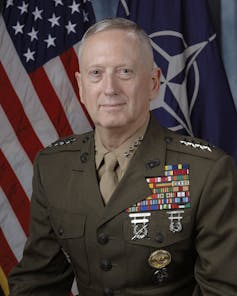 Retired Gen. James Mattis was the second career military officer to receive a waiver of a waiting period between his uniformed service and becoming the secretary of defense.
U.S. Department of Defense, via Wikimedia Commons[42]
Retired Gen. James Mattis was the second career military officer to receive a waiver of a waiting period between his uniformed service and becoming the secretary of defense.
U.S. Department of Defense, via Wikimedia Commons[42]
It took nearly 70 years for the second waiver to be granted, to retired Gen. James Mattis[43] in 2017. His confirmation faced early resistance[44] from senators, especially Democrats, because Mattis had left the Marines just four years earlier. In reluctantly voting to confirm Mattis, Sen. Jack Reed, a Rhode Island Democrat on the Senate Armed Services Committee, cautioned that “waiving the law should happen no more than once a generation[45].”
Austin is now poised to become the third recipient of a waiver. He professes to have acquired a civilian mindset[46] since leaving active duty, but the rationale underlying the waiting period remains as vital and relevant[47] as ever.
“An Army is not a deliberative body[48],” the Supreme Court once observed.
Giving career members of this body the authority to decide how America’s blood and treasure are spent should be the exception, not the rule.
References
- ^ four-star general (www.nbcbayarea.com)
- ^ Austin displayed valor and courage (www.theatlantic.com)
- ^ sticking point (www.politico.com)
- ^ law requires (www.law.cornell.edu)
- ^ out of uniform for at least seven years (www.wsj.com)
- ^ only done twice since 1947 (www.cnn.com)
- ^ Austin’s nomination is historic (abcnews.go.com)
- ^ step toward broadening (www.nytimes.com)
- ^ white male leadership ranks (www.politico.com)
- ^ clouding his prospects (news.yahoo.com)
- ^ why the seven-year delay exists (www.law.cornell.edu)
- ^ U.S. Central Command, via Wikimedia Commons (commons.wikimedia.org)
- ^ military tradition (abcnews.go.com)
- ^ large military forces as the hallmark of authoritarianism (avalon.law.yale.edu)
- ^ how armies are used (thestrategybridge.org)
- ^ always be subordinate (constitutioncenter.org)
- ^ directly accountable to the people (web.archive.org)
- ^ Gilbert Stuart, via Wikimedia Commons (commons.wikimedia.org)
- ^ Samuel Adams (web.archive.org)
- ^ Virginia Declaration of Rights (www.archives.gov)
- ^ specifically prescribed (www.heritage.org)
- ^ civilian control (www.thenation.com)
- ^ fallen under the spell (constitutioncenter.org)
- ^ As MacArthur saw things (thestrategybridge.org)
- ^ seven years (www.law.cornell.edu)
- ^ star to fade (crsreports.congress.gov)
- ^ Monica King, U.S. Army/Department of Defense, via Wikimedia Commons (en.wikipedia.org)
- ^ Chuck Hagel (www.nytimes.com)
- ^ led the Pentagon (www.politico.com)
- ^ James Forrestal (www.britannica.com)
- ^ my nearly 20 years as a military lawyer (centerforlaw.org)
- ^ single voice of authority (armypubs.army.mil)
- ^ Sign up for The Conversation’s newsletter (theconversation.com)
- ^ specialized society (caselaw.findlaw.com)
- ^ laws and traditions (caselaw.findlaw.com)
- ^ law is that of obedience (caselaw.findlaw.com)
- ^ U.S. Department of Defense, via Wikimedia Commons (commons.wikimedia.org)
- ^ waiver of the waiting period (www.nytimes.com)
- ^ candid observation (crsreports.congress.gov)
- ^ uniquely qualified to oversee U.S. forces (crsreports.congress.gov)
- ^ Congress stated at the time (constitutioncenter.org)
- ^ U.S. Department of Defense, via Wikimedia Commons (commons.wikimedia.org)
- ^ James Mattis (crsreports.congress.gov)
- ^ His confirmation faced early resistance (www.politico.com)
- ^ waiving the law should happen no more than once a generation (www.npr.org)
- ^ civilian mindset (www.cbsnews.com)
- ^ vital and relevant (www.politico.com)
- ^ An Army is not a deliberative body (caselaw.findlaw.com)
Authors: Dwight Stirling, Lecturer in Law, University of Southern California
Read more https://theconversation.com/why-retired-generals-rarely-lead-the-pentagon-151815

